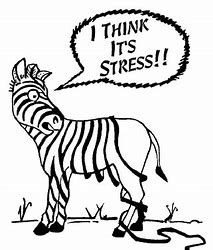 Everyone feels stressed from time to time. But what is stress? How does it affect your health? And what can you do about it? Stress is how the brain and body respond to any demand. Every type of demand or stressor—such as exercise, work, school, major life changes, or traumatic events—can be stressful. Stress can affect your health. It is important to pay attention to how you deal with minor and major stress events so that you know when to seek help. Here are five things you should know about stress: 1. Stress affects everyone. Everyone feels stressed from time to time. Some people may cope with stress more effectively or recover from stressful events more quickly than others. There are different types of stress—all of which carry physical and mental health risks. A stressor may be a one time or short term occurrence, or it can be an occurrence that keeps happening over a long period of time. Examples of stress include:
2. Not all stress is bad. Stress can motivate people to prepare or perform, like when they need to take a test or interview for a new job. Stress can even be life-saving in some situations. In response to danger, your body prepares to face a threat or flee to safety. In these situations, your pulse quickens, you breathe faster, your muscles tense, your brain uses more oxygen and increases activity—all functions aimed at survival. 3. Long-term stress can harm your health. Health problems can occur if the stress response goes on for too long or becomes chronic, such as when the source of stress is constant, or if the response continues after the danger has subsided. With chronic stress, those same life-saving responses in your body can suppress immune, digestive, sleep, and reproductive systems, which may cause them to stop working normally. Different people may feel stress in different ways. For example, some people experience mainly digestive symptoms, while others may have headaches, sleeplessness, sadness, anger or irritability. People under chronic stress are prone to more frequent and severe viral infections, such as the flu or common cold. Routine stress may be the hardest type of stress to notice at first. Because the source of stress tends to be more constant than in cases of acute or traumatic stress, the body gets no clear signal to return to normal functioning. Over time, continued strain on your body from routine stress may contribute to serious health problems, such as heart disease, high blood pressure, diabetes, and other illnesses, as well as mental disorders like depression or anxiety. 4. There are ways to manage stress. The effects of stress tend to build up over time. Taking practical steps to manage your stress can reduce or prevent these effects. The following are some tips that may help you to cope with stress:
5. If you’re overwhelmed by stress, ask for help from a health professional. You should seek help right away if you have suicidal thoughts, are overwhelmed, feel you cannot cope, or are using drugs or alcohol to cope. Your doctor may be able to provide a recommendation. You can find resources to help you find a mental health provider by visiting Substance Abuse and Mental Health Services Administration (SAHMSA)-https://findtreatment.samhsa.gov/locator/about.html#.XrSppm5FxPY Local help is available through the Mental Health Association in New Jersey: https://www.njmentalhealthcares.org/ If you have a mental health emergency dial 911. Comments are closed.
|
Archives
November 2023
Archives
November 2023
Archives
November 2023
Categories
All
|




 RSS Feed
RSS Feed

